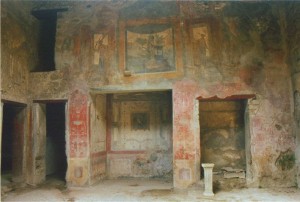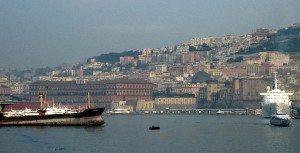 The Italian press recently had a field day in its coverage of the sad decline of one of Italy’s greatest tourist draws: Pompeii. In early October, a prominent Italian newspaper ran a front-page editorial on the subject, calling the crumbling Roman ruins a “symbol of all the sloppiness and inefficiencies of a country that has lost its good sense.” Soon after, Italian politicians leaped into the fray, taking aim at the deep cuts that Silvio Berlusconi’s government has made in cultural funding since 2007.
The Italian press recently had a field day in its coverage of the sad decline of one of Italy’s greatest tourist draws: Pompeii. In early October, a prominent Italian newspaper ran a front-page editorial on the subject, calling the crumbling Roman ruins a “symbol of all the sloppiness and inefficiencies of a country that has lost its good sense.” Soon after, Italian politicians leaped into the fray, taking aim at the deep cuts that Silvio Berlusconi’s government has made in cultural funding since 2007.
Such cutbacks are certainly not helping Pompeii. Its grand villas and delicate frescoes require almost constant maintenance and restoration–a very expensive proposition. And there are a lot of them to maintain. But I keep thinking about a conversation I had with a prominent archaeologist over lunch at Pompeii a few years ago, when he brought up the problem of awarding contracts for such work in a region long controlled by the Camorra, a powerful, secretive criminal organization based in nearby Naples.
 The Camorra, notes Tom Behan, a senior lecturer in Italian studies at the University of Kent in England, constructs “parallel states” in the territories it controls. Through intimidation and domination of local politicians, adds Behan, the author of See Naples and Die: The Camorra and Organized Crime, these criminals pursue a wide range of activities, from drug trafficking and racketeering to human smuggling and government contract frauds.
The Camorra, notes Tom Behan, a senior lecturer in Italian studies at the University of Kent in England, constructs “parallel states” in the territories it controls. Through intimidation and domination of local politicians, adds Behan, the author of See Naples and Die: The Camorra and Organized Crime, these criminals pursue a wide range of activities, from drug trafficking and racketeering to human smuggling and government contract frauds.
As a kind of state within a state in the region of Campania, the Camorra has left a disastrous legacy, as detailed by investigative journalist Roberto Saviano in his book, Gomorrah. Nearly 30 years ago, for example, Camorra dons decided to get into the business of hauling and disposing garbage. Their workers dug dozens of illegal dumps in the countryside of Campania and filled them with toxic and industrial wastes they trucked in from across Italy. Today these cesspits threaten to pollute local water supplies and agricultural lands.
Is the Camorra active in and around Pompeii? In 2000, Archaeology magazine reported that the organization apparently attempted to place its own affiliates as guards at the site and to land lucrative contracts for the maintenance and restoration of the ancient villas. To stop such criminal activity, Pietro Giovanni Guzzo, the then-superintendent of the site, put new bidding procedures in place. “We have asked the police to oversee all contract bidding to ensure firms competing for projects are not linked in any way to criminal activity,” Guzzo told Archaeology.
A few years later, however, Italian police arrested 13 people in an alleged scheme to force Pompeii’s management to purchase coffee from a single supplier at extremely high prices. And in May 2004, a horrendous crime took place near Pompeii. Forty-three-year-old Carlo Cirillo, a leftist candidate in city elections in the modern municipality of Pompeii, went missing at the height of the campaign. Police later found his body at the side of a road. Someone had murdered the aspiring politician by cutting his head off with a hatchet.
All this sounds an awful lot like The Godfather to me. And I wonder whether Italian police are still keeping a vigilant eye on the contracts issued for maintenance at Pompeii. Maybe, just maybe, inefficiency and sloppiness are the least of the Italian problems afflicting Pompeii.
Upper Photo: Villa of Ara Massima, Pompeii. Courtesy Canadacow.
Lower Photo: The port of Naples. Courtesy of Lance Mountain.
fascinating story, heather. guess we should be glad there are no roman relics in jersey? 🙂
Hmmh. Now that’s an idea. Pompeii in Jersey. Could be a casino, eh?
Nice ruin you got here. Shame if anything were to happen to it…
Yes, indeed. In 2007, intruders broke into one of Pompeii’s grander villas and toppled a large and very heavy column, breaking it into several pieces. At the time, Pompeii’s superintendent, Pietro Giovanni Guzzo, called the incident “extremely serious,” and described it as an “act of intimidation rather than a simple case of vandalism.” He then added, “we will stand firm against threats.”
There’s an interesting video clip on the current 2010 protests over garbage disposal in the Naples region here:
http://www.newsy.com/videos/eu-to-italy-clean-up-naples-trash/
Also MSNBC has a story here on a prosecutorial investigation into whether or not the Camorra might be involved in the 2010 protests over a new landfill site near Naples:
http://www.msnbc.msn.com/id/39836192
Whether threatened by the Camorra or the rain – as this Reuters article suggests – Italy and UNESCO should do a better job of preserving this incredible heritage site.
http://www.vancouversun.com/travel/Ancient+Pompeii+gladiator+house+collapses/3789341/story.html
Dan: What a disaster! I think there are a lot of factors at play in Pompeii’s deterioration. Mother nature is definitely one of them.